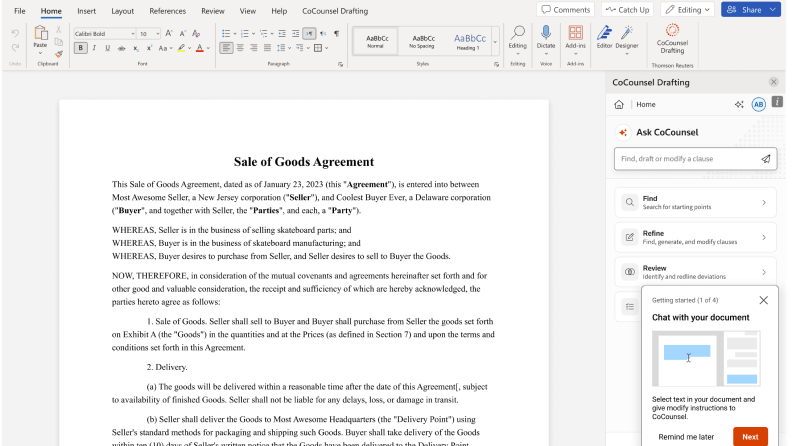Understanding the nuances between agreements and contracts is crucial in the legal realm, focusing on enforceability and formality.
Legal terms · contract · agreement vs. contract
The differences between a contract and an agreement, like most considerations in the legal sphere, come down to the particulars of the language and intent surrounding the parties involved. In short, a contract is definitionally a type of agreement, but not all agreements rise to the level of a legally binding, enforceable contract.
Below, we will explore some of the elements that constitute both of these legal concepts and provide some context for their drafting as well as some examples of how they work. Both contracts and agreements have an important role in the day-to-day business dealings of individuals and companies around the country, and understanding their usefulness is critical for both the business and legal communities.
Jump to ↓
| Key differences between agreement and contract |
| When does an agreement become a contract? |
| Final words |

CoCounsel Drafting
Professional-grade GenAI for drafting right from within Microsoft Word
Free drafting demo ↗Key differences between agreement and contract
An agreement and a contract share the fundamental purpose of establishing mutual obligations between parties, yet they differ in their legal implications and formalities. Essentially, a contract is a more stringent form of agreement, embodying legal consequences and enforceable rights and obligations, whereas an agreement encompasses a broader spectrum of informal understandings.
Both involve the meeting of minds and exchange of promises, but a contract typically entails a more formalized arrangement, often documented in writing, and carries legal enforceability.
Conversely, an agreement can be informal and may not always be legally binding. While contracts require elements such as consideration, legality, capacity, and mutual assent to be legally valid, agreements may lack such requirements.
What is an agreement?
On the other hand, an agreement is a similarly engineered deal between parties with a common interest, but it does not rise to the same level of legal enforceability that a contract does. As such, an agreement is simply the “manifestation of mutual assent by two or more persons to one another.” This “meeting of the minds” indicates common intentions and is expressed through an offer and an acceptance.
Agreements can be shown with words, and actions can even be indicated in some instances with silence. While agreements are often lumped with contracts colloquially, an agreement generally lacks definitive elements like “consideration,” in order to rise to that level.
Further, different jurisdictions will treat and adjudicate agreements slightly differently. In the state of Washington, an agreement does not carry the same legal implications as a contract, but in Pennsylvania, an agreement can, in fact, be enforced with the same force as a contract if “the parties intend to enter into a binding agreement.” Muddying the water even more, California law distinguishes between a “final agreement” and an “agreement to agree,” which is dependent on the parties’ intent.
What are some examples of agreements?
There are many types of contracts and relationships that necessitate some form of agreement. Two common forms of such agreements are the Master Service Agreement (MSA) and the Statement of Work (SoW).
Generally, MSAs are broad, foundational contract arrangements that delineate the scope of a relationship between entities conducting business together. On the other hand, an SoW lays out the specific expectations and timelines governing a given project. As such, the SoW is a very useful tool for businesses, individuals, and municipalities hoping to develop effective working relationships with one another. Oftentimes, an SoW is drafted when parties have a desire to collaborate on the mutual completion of a goal or project.
Another popular form of this type of arrangement is the “indemnity agreement.” An indemnity agreement is “an arrangement whereby one party agrees to pay the other party for any damages regardless of who is at fault.” Indemnity agreements are similar to a “hold harmless agreement,” which is aimed at ensuring a given party is not held for liability “arising out of the indemnitor’s negligent act or omission,” the university adds.
In instances when one party means to limit the extent of what information another party can disclose, they might draft a “confidentiality agreement” or a “non-disclosure agreement (NDA).” These agreements are used to stunt the improper, unauthorized disclosure of a piece of information.
What is a contract?
A contract is a formal, legally binding agreement made between two parties with a common interest in mind. This creates “mutual obligations that are enforceable by law.”
In nearly all cases when a contract is formed, the arrangement begins with an offer and then several other key elements must be satisfied to codify the contract. Some examples of common contracts are:
- Mortgage agreements
- Lease agreements
- Online purchases
- Sign-up agreements
- Insurance
- Promissory notes
When does an agreement become a contract?
As mentioned above, the distinction between a contract and an agreement generally lies with the ingredients. In order to elevate most agreements into legally enforceable contracts, certain elements must be present. Some of the elements required for a contract overlap with that of an agreement, however, a contract agreement will almost always need some form of “consideration” in order to withstand legal scrutiny.
The key elements of a contract are Offer, Acceptance, Awareness, Consideration, Capacity, and Legality.
- Offer– One party promising to do something, or conversely, promising to refrain from doing a particular action which could be in the form of a written contract
- Acceptance– The unambiguous nature by which an agreement is solidified. This may be done verbally, or through performance or deed
- Awareness– Both parties acknowledge the contract agreement exists
- Consideration– When something of value is offered in exchange for the above-stated action or inaction; the value that induces the parties to enter into the contract
- Capacity– Individuals must have the ability to reasonably have a mutual understanding of what entering a contract agreement means; individuals compromised by, for example, alcohol, may be found to lack capacity with respect to contract law
- Legality– Valid contracts must fall in line with existing laws

White paper
Smarter about Contracts: Bringing a system of intelligence to contract lifecycle management
Access white paper ↗Final words
An agreement is often more informal than a contract and often serves as the precursor to a legally enforceable contract. It’s crucial to have one in case of arbitration, litigation, or a breach of contract.
Generally, a contract is a legally binding agreement made between two parties with a common interest in mind. On the other hand, an agreement is a similarly engineered deal between parties but usually does not rise to the same level of legal enforceability as a contract does.
For help drafting all your contracts, agreements, and clauses, visit here.










